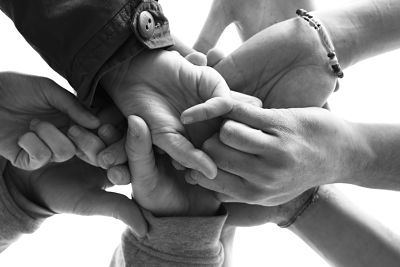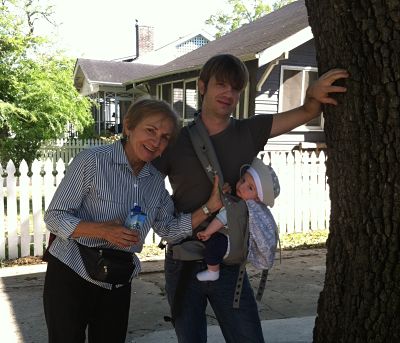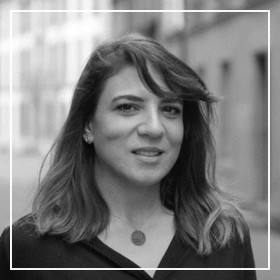Anxieties of Arrival
Like many accounts of ethnographic fieldwork, this one begins with an arrival story. When I arrived for my fieldwork stay in New Orleans, Louisiana on September 1, 2013, I was noticeably pregnant – 6 months along to be more precise. With a spouse, half-blind cat, and packed Volvo station wagon in tow, I anticipated a relatively smooth entrance into my research since I had been to New Orleans on three separate trips, ranging anywhere from 6 weeks to 4 months. I was excited to return to the city, where I had grown to love its inviting landscape and the wry humor of its residents. Yet, this was the first time we had completely relocated – with all of our furniture, our personal belongings, our household. That last point is particularly significant. I would give birth here, so the field as an abstract notion was quite concretely a location in which we would add a new dimension to our family unit.
After pulling up to the house we had rented, I stepped out of the car and was immediately hit by air thick with humidity. I was surprised by how strong my reaction was and the clichéd nature of the experience. After all, I had spent several summers in New Orleans, a fact that many residents reacted to with incredulity – “wait, you came here in the summer? Willingly?” I had expected the drive down from New Jersey to be like a frog swimming contentedly in slowly boiling water, notwithstanding the end result. Each stop to fill the car up with gas or take one of many restroom breaks would, in theory, acclimate us to a slightly warmer, slightly more humid atmosphere, until we were completely acclimated. Instead, I was sweating profusely and nervously thinking about how much hotter it would be during the daytime. It should be noted that one of the many wonders of pregnancy is the ability to sweat in temperatures approaching meat locker levels.
While I had spent my first three decades of my life embracing unrootedness – traveling and living in different countries – I found my sense of self becoming unmoored during those first couple of weeks. I was in a city renowned for its deep family rootedness, yet I had no family besides my husband and my son-to-be. I certainly knew people in New Orleans – even people I would call friends, but it could not counter my deep existential realization that I would give birth in a city where I had no kin.
During that initial period in the field, I experienced many hallmarks of the early days of fieldwork – nervousness about approaching or re-approaching interlocutors, feelings of loneliness, and confusion regarding the vastness of ethnographic possibilities.
But I also felt the idiosyncrasies of my own experience. I felt very visibly present. I did not want to stick out as “the pregnant lady;” rather, I wanted to disappear into the city, into my research. Of course, no one can disappear into research, but I wanted to all the same.
I don’t mean to exaggerate the foreignness of our new home. It may seem to many as though a vast cultural gulf exists between central New Jersey (where my university is located) and New Orleans, but these differences are often exaggerated. The business of being born largely functions the same way – hospitals provide a standard of care good enough for those who can afford it through insurance. Pregnant women go through the same medicalized drill of weekly pee-in-a-cup sessions, weight check, ultrasounds, and long waits in a chilly doctor’s office while thinly dressed in a paper cover. Indeed, as time passed that fall, I became more comfortable in the city we would call home for the next 13 months. I conducted some research, re-established contacts, and, eventually, gave birth. After a period of bonding with the baby, I resumed research.
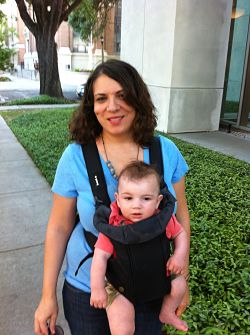 I did so with the help of my husband and for extended periods at a time, my parents and my mother-in-law.
I did so with the help of my husband and for extended periods at a time, my parents and my mother-in-law.
Throughout my ethnographic stay and after, I have thought about the ongoing experience of shared living space with extended family. Not only in terms of how their contributions, their multiple labors, have allowed my work to continue, but also in terms of how it placated my anxiety and rooted me to my field site by providing affective support.
A Labor of Love and Duty
My mom is a workhorse – and I mean that in the nicest way possible. Having (mostly) ended a career as a professor and later university administrator, retirement has been less about relaxing and more about investing energy into newfound pursuits. Always a project-centered thinker and worker, my newborn son was one such project she could focus her attention upon. On and off throughout my fieldwork in New Orleans, she – along with my father, the Oscar to her Felix and always quick with a witticism or gentle barb – helped my spouse and I raise our baby son in his first year. And by “help” I am referring to the 3 C’s of household reproductive labor – cleaning, cooking, and caretaking. They temporarily relocated from their home in Turkey and lived with us in New Orleans.
Living with my parents (or rather, their living with us) brought forth multiple challenges as well as huge benefits. There were too many moments of pure joy to count: crowding around to witness my son’s first bath, taking walks together under the giant live oaks of City Park, laughing around the dinner table while eating a late meal after I had sprinted in following yet another research-related event. There were tensions as well, normal conflicts that arise when different generations, different parenting styles, and different cultural practices bump up against one another. Slammed doors, passive-aggressive utterances under the breath, and clenched jaws and raised eyebrows were normal reactions, often on the part of my husband and me. After all, my mother comes from a parenting generation in which second-wave feminism in a “developing” country such as Turkey reigned supreme: after formal education women did not leave the workforce to raise children, Dr. Spock was the preeminent baby expert, and formula was a miraculous product of modernity, freeing a mother from the unpredictability of the breastfeeding experience. For much of the first couple of months of my son’s life, my mother clutched a tattered Dr. Spock book in her hand (the very one she used with me), and read to me out loud about the importance of a tight schedule for feedings and naps. This wasn’t the way my husband I had imagined raising our baby, but the dialectical interplay between old school and new school created a bricolage approach to collective child rearing in our household.
My parents’ commitment to their children and grandchildren is driven by a deep sense of love tempered with a high dose of duty (or perhaps the other way around?). This understanding of family, however, is never articulated as such. It just is.
My grandmother came to the U.S. from Turkey to help raise me when I was an infant and my mother needed to work. All my aunts helped to raise their grandchildren in Turkey. Though I may be wrong, I don’t think any of these women stopped for one moment to think whether or not they should play a large role in helping to raise grandchildren. I always joke that my parents’ question to my husband and me wasn’t, “Shall we come and help?” Rather, it was “When shall we come and help?” It turns out their help extended beyond the admittedly generous parameters of diaper changing and food preparation.
Fieldwork Interventions
When I arrived for my initial, predissertation research trip to New Orleans in 2011 and 2012, I came thinking that I would study the labor of post-Katrina Latino workers and their contributions to a changed and ever-changing urban landscape. However, while conducting this preliminary research I found myself continually meeting people originally from Honduras. Through further investigation I discovered a rich history of migration from Honduras to New Orleans and a complex relationship between the two societies fostered through the intervention of New Orleans-based fruit companies in the banana-growing regions of the country. Returning to the field for my ethnographic stay, I anticipated relying on key gatekeepers I had met in earlier trips to assist with meeting more research interlocutors.
What I did not anticipate was that my family would become actors in making these connections.
New Orleans is, in many ways, a Honduran town, though the Honduran presence has often been minimized and enveloped within a larger Latina population, and often attributed to a post-Katrina influx. Besides my own research, my family’s multiple experiences made the Honduranness of New Orleans visible for me. Multiple times my husband would bound in the house excitedly proclaiming, “I just met a Honduran while filling up the car with gas!” or “I chatted with a guy from Honduras working at the carwash. I got his number for you.” One night I was working at home and I noticed my husband was taking an unusually long time to buy a soda from the corner store. Eventually he came in with our son nestled in the crook of one arm, exclaiming, “Hey, there’s a group of Hondurans living two doors down! They invited me for drinks and they want to meet you!” These individuals eventually became research participants and friends and we became, I would like to think, good neighbors.
My mother was in the habit of taking my son for a daily walk through the neighborhood. Multiple times she passed by a woman sitting on her front porch and they began chatting daily. The woman cooed over my son and talked about her own children and grandchildren with my mother. One day my mother came in with a smile, telling me that the lady was originally from Honduras. She then handed me a piece of paper with her phone number written on it and informed me that she had taken the liberty to schedule an appointment for me to meet with her. I looked at my husband with disbelief – did my mother really just schedule an interview for me without asking? She joked that the entire family was involved in my research effort. How right she was. This connection did turn into an interview, and an illustrative one at that.
Yet another serendipitous incident stands out in my mind: the night before my parents were scheduled to leave by car, their car was stolen. My father had the habit of sipping tea and looking out the window every morning to observe the goings-on in the neighborhood. At some point early in the morning my decidedly confused father poked his head in my bedroom and matter-of-factly informed me that the car was no longer parked out front. At first I didn’t believe him but when faced with the blatant lack of car in said space, I was quickly disabused of any disbelief. After a short phone call to the police and subsequent long wait to file a police report, a few weeks went by. Then came an unexpected phone call from the police stating that the car had been found, sans functioning tires. After a daylong trip to the impound company, my father searched for a used tire dealer. A chance call on one such company led to yet another enthusiastic entrance by my husband, “Deniz! The tire store owner is Honduran! And he wants to meet you.” That person became one of my closest interlocutors, a valued gatekeeper, and a good friend to my whole family.
A Labor of Privilege
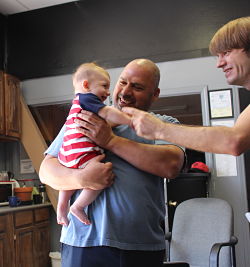 Many of the immigrants I have met in the field are physically separated from their family. Because my research spans multiple generations of migration I have come into contact with individuals who have lived in New Orleans for decades and have most of their close family in New Orleans or other U.S. cities such as Miami and Houston. No matter the decade in which Hondurans have immigrated to New Orleans, however, someone in the extended family remains in another location. For more recent migrants who have made the journey under increasingly perilous conditions, many are separated from the vast majority of their kin, some living in New Orleans alone. Many turn to the church or workers’ organizations or soccer leagues as a way to form kin-like networks with fellow Hondurans or Central Americans. The vast majority send money home and keep in close contact with those abroad. Yet, the distance remains. Every time I set foot out the door and kissed my son good-bye, I had a keen sense of the immediacy of my family, their spatial proximity to me, and the knowledge that I could be home within 15 minutes by car.
Many of the immigrants I have met in the field are physically separated from their family. Because my research spans multiple generations of migration I have come into contact with individuals who have lived in New Orleans for decades and have most of their close family in New Orleans or other U.S. cities such as Miami and Houston. No matter the decade in which Hondurans have immigrated to New Orleans, however, someone in the extended family remains in another location. For more recent migrants who have made the journey under increasingly perilous conditions, many are separated from the vast majority of their kin, some living in New Orleans alone. Many turn to the church or workers’ organizations or soccer leagues as a way to form kin-like networks with fellow Hondurans or Central Americans. The vast majority send money home and keep in close contact with those abroad. Yet, the distance remains. Every time I set foot out the door and kissed my son good-bye, I had a keen sense of the immediacy of my family, their spatial proximity to me, and the knowledge that I could be home within 15 minutes by car.
As feminist scholars have pointed out, household reproductive labor has long enabled waged work. I have only been able to have a baby, care for that baby, and conduct fieldwork in a relatively short span of time due both to my family’s material contributions and their immaterial support in providing comfort, counsel, and an embodied closeness. Many of my research participants have pointed to work – or the ability to work – as a privilege and even, at times, a blessing. I have a bit of my mom in me – a bit of the nose-to-the-grindstone workhorse. I like the labor of fieldwork, of studying, and of teaching. Yet, I’ve come to realize that this labor too is deeply privileged. Luckily my parents were retired. Luckily they had the funds to come and visit. Luckily they had the legal documentation that allowed them to enter the U.S. Luckily my husband could work from home and make his own hours.
Luck is, essentially, just another word for privilege. I would argue that embedded within the intersecting forms of racial, class, gender, and legal privilege is familial privilege. Notwithstanding the tensions inherent in close quarters, my ability to work was singularly facilitated by my parents’ (and husband’s and mother-in-law’s) unpaid labor.
In the end, most anxieties I felt upon arrival were short-lived. My interactions with individuals could not have been better. I formed deep relationships with people who were warm, open, and caring. These early moments of fear were acutely felt, so they were, in hindsight, important to the overall experience of fieldwork. Clearly, I’m not the first person to do fieldwork or work outside of the home while having a child. I’m also not the first person to be nervous because of it. Yet, I have to recognize the important role the people closest to me – my husband, my parents, and my mother-in-law – played in facilitating my transition from anxious researcher to new mother to not-so-anxious researcher. With the help of my family, having a baby anchored me to this city and the community I was working with in ways I could not have imagined.

